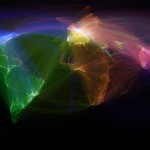Our Friendship Exists Because of Facebook
For the purpose of this blog post, I will be focusing on my social networks within Facebook alone, as focusing on all of the social media platforms in which I participate would take much more than 500 words, and no one would ever want to read it.
I have 834 friends on Facebook. What this means, other than the fact that I probably need to go through them and unfriend those who I don’t even know anymore, is that my News Feed is regularly updated. If I refresh my browser or my phone app, I will likely see many new posts. What’s interesting about this however, something that potentially can strongly impact the strength of my connections with these people, is the fact that I don’t see every post by every friend. Facebook’s algorithms attempt to “perfect” my News Feed by only showing me posts that it thinks I would be interested in. So, instead of seeing a very recent post by Distant High School Acquaintance, I will instead see a three-day-old post from Close College Friend, because I am more likely to interact with and therefore theoretically enjoy a post from my newer friends than people who I honestly don’t really care much about anymore.
The fact that Facebook’s algorithms do this can potentially have a strong impact on the type and strength of connections I have with my social networks there. If I only see posts that Facebook thinks I’d be interested in, then I can only interact with those posts, and therefore only develop those social connections. Further, the same is happening to everyone else – only the people that see my posts can interact with them.
I see this impact in several ways when I use Facebook. One of these is that the same general group of people often like my statuses at a higher rate than other social groups. For example, on a recent cover photo update, almost every single interaction is from someone I know since I got to college – very few high school friends, or people I know from other random events, liked the photo. Perhaps this means that they just didn’t care about the photo update, which would of course make sense. But perhaps it also reflects the fact that Facebook assumed they wouldn’t care, and never gave them the chance to see it. Think about the potential consequences of this. Maybe someone with a new love interest is disappointed that he never saw her photo, but maybe he never saw it in the first place because since they haven’t interacted often in the past, Facebook assumed he wouldn’t want to see it.
When we think about our social networks, particularly in relation to social networking sites, we need to consider the impact that those sites have on our relationships, and not just the way we affect them ourselves. Facebook alone has a very powerful way to manipulate my social networks in whatever way it deems appropriate. It would be hard to imagine and quantify how this has impacted my real-world relationships.
 Previous Post
Previous Post
That last line is something I’ve never really put much thought into. I am friends with people on social media that I see on a daily basis but rarely ever speak to. I became friends with the person because Facebook suggested them to me.
Just like someone mentioned in class on Monday, we would not be able to maintain soo many of our friendships without the convenience of Facebook. However, even with this each collection of friends, the algorithm that picks and chooses what we see is, in itself, reinforcing and distancing friends based on our own ‘interest’ in them, or in their posts. Friendship still exists outside of Facebook, but I definitely agree that Facebook has redefined what friendship means.
Your post made me have to sit and think for a minute. I haven’t thought about how Facebook manipulating what I see has affected my personal relationships outside of social media. I feel this is something I need to think on much more! Awesome and thought provoking post